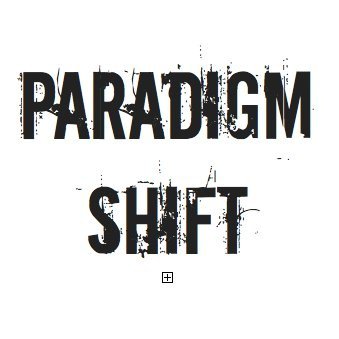Here is another couple of ways to characterise the KM paradigm shift.
 |
| Image from wikimedia commons |
The "individual to collective" culture shift
| From | To |
| I know | We know |
| Knowledge is mine | Knowledge is ours |
| Knowledge is owned | Knowledge is shared |
| Knowledge is personal property | Knowledge is collective/community property |
| Knowledge is personal advantage | Knowledge is company advantage |
| Knowledge is personal | Knowledge is inter-personal |
| I defend what I know | I am open to better knowledge |
| Not invented here (i.e. by me) | Invented in my community |
| New knowledge competes with my personal knowledge | New knowledge improves my personal knowledge |
| other people's knowledge is a threat to me | Shared knowledge helps me |
| Admitting I don’t know is weakness | Admitting I don’t know is the first step to learning |
Here is another way to look at this shift, taken from a paper on The Learning Organisation, by organisational Psychologist Gitte Haslebo, translated by Maja Loua Haslebo.
Shift to a learning organisation
| From | To |
| Knowledge has permanent validity | Knowledge has temporary validity |
| Knowledge = Adding of information from the outside | Knowledge = Insight created from within |
| Learning activates the intellect | Learning activates thoughts, values, emotions and action |
| The right answers must be found | The central questions must be formulated |
| The expert finds the right solution | New ways and new methods are co-created by the employees |
This mirrors the transition from Knower to Learner, and Gitte suggests it is accompanied by a shift in the attitudes of managers and knowledge workers to transition from the attitudes we learned at school to the new attitudes we need at work.
Shift in learning attitudes
| From | To |
| Do not make mistakes | Learn from your mistakes |
| Do not reveal that there is something you do not know | It is a good thing to admit that there is something you do not know |
| Do not make a fool of yourself | It is important to explain what you wonder about. |
| Know that the teacher is always right | Know that your manager may be wrong. |
| What counts is the individual achievement | What matters is teamwork |
| If you ask the person sitting next to you, you are cheating | When there is something you do not know, ask your colleague |
So there are 3 ways to look at the shift, with significant overlap between them. They give you some ideas of the culture you need to aim for in KM - the sort of attitudes and behaviours that a learning organisation, and the people within it, should exhibit.




No comments:
Post a Comment